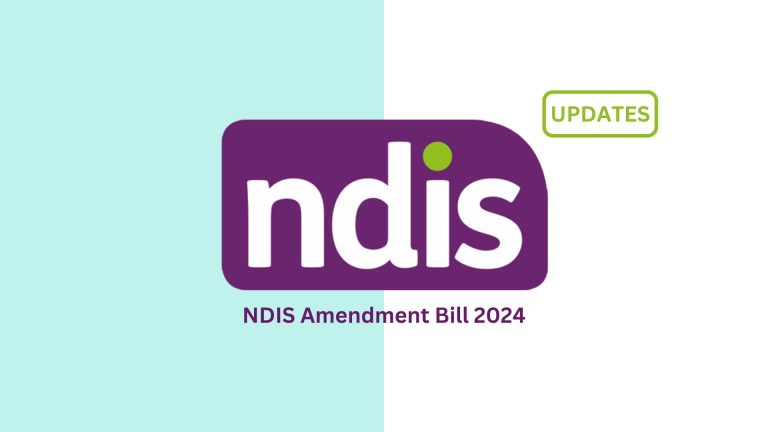
The National Disability Insurance Scheme (NDIS) provides financial support to Australians with significant and permanent disabilities, helping them access essential services and live a more independent life. The NDIS covers a wide range of supports, from personal care and therapy-based services like occupational therapy and speech pathology. As of 2024, the NDIS is currently undergoing significant legislative reform. The recently passed NDIS Amendment Bill 2024 is designed to improve how the scheme operates, ensuring that it is more efficient, participant-centred, and sustainable in the long term. Whilst the changes focus on making the scheme more accessible, transparent, and supportive for people with disabilities (and their associated families), the upcoming changes could potentially affect how people currently access support or engage with services under their existing NDIS plan.
In this post, we break down the key elements of the bill and what they mean for participants, service providers, and the broader allied health community. We’ll explore how these changes could impact you, the services you receive, and the wider implications for support under the NDIS.
The NDIS Amendment Bill 2024
The NDIS Amendment Bill aims to improve the scheme in line with the recommendations of the 2023 Independent NDIS Review. The amendments provide the legal foundation needed to address several pressing issues that were identified throughout the review. Some of the issues highlighted in the Independent NDIS Review include:
- Clarifying participant eligibility
- Ensuring better financial management of funds
- Increasing the overall transparency of the scheme
One of the bill’s key objectives is to make the NDIS more about people – putting participants at the heart of decision-making. By prioritising participant needs, the legislation ensures that the system is more adaptive, with participants having more say in how their support plans are created and adjusted. The new rules will be implemented progressively to support a smooth transition, while essential reforms, like foundational supports and improvements to the eligibility criteria, will be developed in collaboration with people with disabilities and the broader community. This approach aims to ensure that the NDIS continues to meet participants’ diverse needs, without compromising on the scheme’s long-term sustainability.
The changes represent a proactive step by the government to ensure every NDIS dollar is effectively spent on those for whom the scheme was created. These adjustments are not just about improving service delivery, but about reinforcing the core mission of the NDIS: to provide meaningful, person-centred support that enhances the lives of those who need it.

How the Changes Will Affect People with Disabilities
For people with disabilities, these legislative changes aim to bring clarity and improved support pathways for those who need it most. One major focus of the bill is enhancing transparency, particularly around eligibility for different NDIS supports. Participants will gain a clearer understanding of whether they qualify for support and, if not, whether they are better suited to other systems. Role of OTs in
For example, under the previous system, a participant might have received funding for prescription glasses through the NDIS. However, under the new changes, they may now need to access these supports through another government scheme, such as Medicare or Hearing Australia, which are more aligned with general health services (than disability-specific funding).
The bill also introduces important changes for specific groups. People with psychosocial disabilities and children under nine years old with developmental delays will benefit from updated early intervention pathways. Early access to support has been recognised as a crucial step in reducing long-term care needs, a shift that aligns with the NDIS’s goal of fostering independence and inclusion. The new pathway for early intervention will include aspects like targeted supports designed to address developmental delays earlier, reducing the need for more intensive interventions later in life.
Another significant development is the introduction of a more flexible approach to budgeting. Participants will have greater control over how they use their allocated funds, giving them the ability to tailor supports to meet their unique needs. This change moves away from rigid, line-by-line funding plans, allowing for a more dynamic and responsive way to manage NDIS funds. Ultimately, this aims to lead to improved social and economic participation for participants, allowing them to play a more active role in their communities.
There are several other updates too. At Therapy Partners, we will ensure that all clients are thoroughly updated by their therapist regarding any changes that directly concern them. We encourage participants and families to follow our channels for further updates, as we release more detailed information as well as additional announcements from the NDIS.
Planning & Funds Flexibility
One of the standout changes in the NDIS Amendment Bill is the overhaul of how funds will be managed. The new framework introduces flexible budgets that give participants more autonomy in how they allocate their funding. Under the current system, participants often find themselves restricted by highly specific budget line items that limit their ability to adapt their plans as their needs evolve.
For example, under the existing system, if a participant had funding specifically for transportation, but needed extra funding for in-home care, they couldn’t easily re-allocate those funds.
The new flexible funding approach, categorised as “reasonable and necessary budgets,” empowers participants to manage their funds more efficiently and in ways that reflect their individual circumstances.
Alongside this, participants will receive impairment notices, a formal acknowledgment of the impairments that qualify them for NDIS supports. This notice will be key in determining funding allocation and will ensure participants know which supports they are entitled to access based on their impairments. For new participants, impairment notices will be issued starting January 2025, with existing participants receiving theirs at a later (yet-to-be-confirmed) date.
Participants and their providers will also need to adapt to the new framework for funding periods. Rather than receiving all their funding upfront, allocations will be divided into manageable intervals, typically no longer than 12 months.
For example, under the previous system, a participant might have received all their allocated funding for assistive technology in one lump sum. Under the new system, they may receive these funds in smaller, more manageable portions spread over a year.
This change aims to make it easier for participants to manage their spending and avoid prematurely running out of funds.
- Clinic Location: Robina
2/201 Ron Penhaligon Way, Robina, 4226
Gold Coast, Queensland
Impact on Support Coordinators & Service Providers
The NDIS Amendment Bill also introduces a range of implications for service providers and support coordinators that operate within the NDIS. A critical aspect will be the ability to navigate the “in” and “out” lists for NDIS supports. These lists determine which supports are covered under the new framework and which are excluded. Providers will need to ensure they are familiar with these lists to guide participants effectively through their funding decisions and spending.
To help participants stay updated on the latest changes, we encourage you to attend the free NDIS Informational sessions being held nationwide. These sessions are designed to provide participants and their families with the most up-to-date and accurate information directly from the NDIS, ensuring there is no misinterpretation of the new rules. As these changes may take some time to fully implement and understand, staying connected with official NDIS updates will be crucial. You can find more information about these sessions on the NDIS website or by contacting the NDIS directly.
With the introduction of flexible budgets, service providers, support coordinators, and plan managers will need to play an active role in helping participants manage their funds across multiple categories and funding periods to ensure that participants stay within their budgets. This includes working closely with participants to track spending and ensure they remain within their allocated budget, as if a participant overspends, they may be required to seek reassessment or apply for specific exceptions.
Since impairments and funding decisions will be directly linked, maintaining up-to-date records and providing evidence that aligns with a participant’s impairment notice will be essential for securing the appropriate level of support. As a registered provider under the NDIS, Therapy Partners adheres to the strict regulations set by the NDIS Quality and Safeguards Commission, ensuring that all services meet high standards of quality and safety. Registered providers, like us, can only charge within the NDIS Pricing Arrangements and Price Limits, providing transparency and fairness to participants.
For existing participants, we already maintain detailed documentation and evidence of the supports you receive. However, these legislative changes may necessitate new or updated reporting procedures to ensure your level of support remains consistent. Working with a well-documented and informed registered provider will be crucial in navigating these changes, as providers must understand the intricacies of the NDIS to properly support participants and help maximise the benefits they receive from their funding. This added layer of regulation ensures that you receive services that are both safe and cost-effective under the NDIS framework.

The NDIS Amendment Bill 2024 aims to take a significant step forward in improving how the National Disability Insurance Scheme operates and functions. By prioritising transparency, flexibility, and participant-centred decision-making, the bill aims to address concerns, whilst promising a better experience for people who access NDIS support. With clearer eligibility pathways, more flexible funding, and improved access to early intervention supports, the updated scheme promises a brighter future for Australians living with disabilities.
Additional updates to the NDIS Amendment Bill will be released on Thursday 3 October 2024, as well as over the coming months, so it’s important to stay informed of how these changes might affect you. Follow the Therapy Partners channels for the latest updates on NDIS reform, and if you have any questions about how these reforms might specifically apply to you, don’t hesitate to contact us to speak with our team. We’re here to help you navigate these changes and ensure that you can continue to access the support you need.
As these changes are rolled out, it’s important to stay engaged with ongoing consultations and updates from the NDIS. The shift to a more participant-driven, flexible system will undoubtedly enhance the NDIS’s ability to provide life-changing support to Australians with disabilities – now and in the future.





